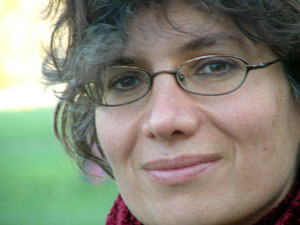“There is a commandment in the appearance of the face, as if a master spoke to me. However, at the same time, the face of the Other is destitute; it is the poor for whom I can do all, and to whom I owe all. “ —Emmanuel Levinas
Rabbi Joshua, the son of Levi, said: at the time that a human being is walking down the road, a host of angels walks before him, crying out, saying, “Make way for the sacred image of God.” —Midrash Tehillim
Hers was the face I couldn’t look into.
Brown Eyes pooling with endless helplessness and need.
Two abysses threatening to swallow me up.
Skin Encrusted with dirt. Matted black hair.
Dark picture of want.
Apparently young, but so, so (!) old and tired.
No trace of joy or beauty.
We were traveling in India for a month—my husband to be, Larry, and I, marking my graduation from JTS in 1995. In Bombay with friends from home, we were all in the back seat of a taxi, going I don’t know where. What I do remember is that we were surrounded by throngs of beggars, outstretched arms, hands open, despair reaching towards us. To them we resembled hope.
One beggar came up close—far too close for comfort—my comfort—her face practically in mine.
And I, I rolled up the window, right in her face.
One of my friends looked at me and simply said “bad behavior” and he was right. It was.
I had many grand and not so grand adventures in India that month—in Bombay I gave a blessing at an Indian Jewish wedding. Hiking Dharamsala, I had a severe allergic reaction and had to be carried down the mountain by a Hindu hermit to a hospital.
With all these adventure it is her face that stays with me. The memory hurts. I still feel guilt for shutting the window on her face. How can I ever make amends to a woman I can never find, whose name I don’t know, a woman, who, if she were still alive, would most certainly not remember that moment, since so many “spiritual adventurers” just like me, have likely refused her since?
Echoed in this week’s parsha, VaEt’chanan is an ongoing Biblical theme: The danger of confronting God. Here, specifically, it is the danger of facing the Divine Face. Moses says,
Face to face, the Lord spoke with you at the mountain out of the midst of the fire: and I stood between the Lord and you at that time, to tell you the word of the Lord, for you were afraid of the fire, and you did not go up on the mountain saying….. (Deuteronomy 4:4-5)
I always thought it was the intensity of God—sheer electric burning power—that the children of Israel were terrified of. But now I wonder whether it’s the very opposite. Perhaps it’s horror of Divine nakedness. The very vulnerability of the Face who spawns all faces.
Perhaps the children of Israel couldn’t face a God who is so profoundly affected by them, who is in turn disappointed, raging, regretting, loving, taking pride in Her children. She is deeply affected by those She cares most about.
And where do we have—or fail to have—face to face encounters with God ? I would suggest that the most direct access we have to divinity in our daily lives is through our very humanity, a humanity that is created in God’s image, b’tzelem elokim.
Thinking back to my face-to-face encounter with the beggar woman, we were on opposite sides of the human divide. She in a long filthy skirt, flanked (if memory serves) by small children or maybe even carrying a baby, I in loosely fitting cotton Indian pants, going through India with nothing but a backpack. She immensely burdened, I, still free from tethering, fancying myself a world adventurer. She begged, while I, like most functioning people, kept my neediness hidden, consciously projecting self-sufficiency. Rolling up the car window, I shut out desperation, destitution, the mirror image I could not bear; a reflection of God I could not bear.
As Levinas says, there is a commandment in the appearance of the face. But I want to use another word here—“call.” “The appearance of the face” issues a specific call to each person we encounter. The beggar’s face still calls to me after two decades, as if she were still approaching, hand outstretched, coming ever closer to my open car window. I failed entirely in shutting her out, as hard as I tried. Indeed, had I responded with kindness to her outstretched hand, I would have likely forgotten her. But as it is, she still calls to me, a human being, a reflection of God.
She, and countless needy others call to us. Their faces forgotten, unforgettable. What will we answer? With what will we answer?
Rabbi Dianne Cohler-Esses is Director of Lifelong Learning at Romemu in New York City. She has previously worked at UJA Federation, the Bronfman Youth Fellowship, and CLAL.

